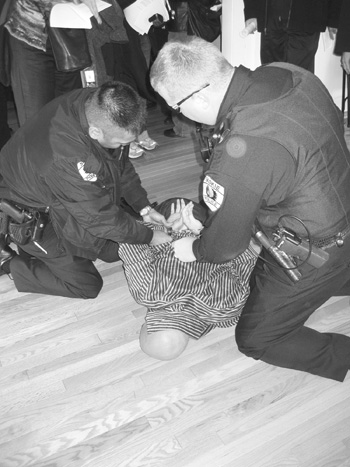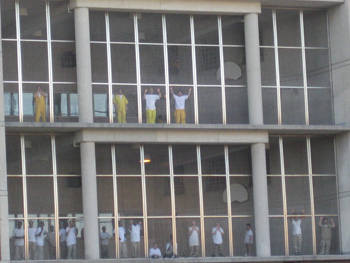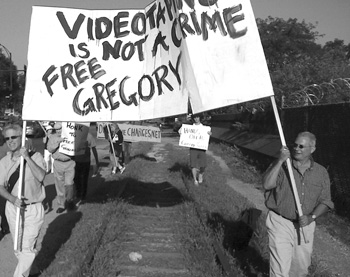Free Gregory!
Gregory Koger's appeal bond hearing is scheduled for this Wednesday, Sept. 22 in Skokie, IL. A big message must be sent by packing the hearing with support for Gregory.
WHAT YOU CAN DO:
1. Sign the petition (at worldcantwait.org) demanding Gregory be immediately released from jail.
2. Donate generously to publish this petition and for the legal appeal (information on the defense committee website, http://www.dropthecharges.net/)
3. Send letters of support to Gregory (information on the defense committee website http://www.dropthecharges.net/)
4. Come to the appeal hearing on Wed., Sept. 22, 9:30 a.m., Cook County Courthouse, 5600 W. Old Orchard Rd., Skokie, IL.
If you are on Facebook, find "Free Gregory Koger!" and build opposition to this highly political prosecution there as well.
The petition has been signed by:
August Berkshire, President of the Minnesota Atheists*
Father Bob Bossie, SCJ
Pat Hill, Exec. Director, African-American Police League*
Prof. Theodore Jennings, Chicago Theological Seminary*
H. Candace Gorman, Attorney for Guantanamo detainees
Cynthia McKinney
Michael Radzilowsky, Attorney
Joann Shapiro
Cindy Sheehan
David Swanson
Debra Sweet
Sunsara Taylor
Matthis Chiroux, The Disobedient*
*For identification purposes only
Latest article on the case from Revolution, September 26, 2010...
Judge Slams Videographer with 300 Days in Jail
FREE GREGORY!
On September 8, more than 40 people came to the Cook County Courthouse in Skokie, IL, to support Gregory Koger at his sentencing hearing. Gregory was arrested in November 2009 at the Ethical Humanist Society of Chicago (EHSC) when he was videotaping a short statement by Sunsara Taylor. Gregory was videotaping Sunsara Taylor's statement for her protection—that is, so there would be an accurate record of what she had said. And for that "crime," the police grabbed, beat and maced him, leaving him with lacerations and contusions. Then they charged HIM with misdemeanor battery, resisting arrest and trespassing. There were many irregularities in this case—leading to an unjust guilty verdict on all counts, the highly unusual revocation of bail while awaiting sentencing, and now culminating in this totally disproportionate sentence and the outrageous lies used to justify it. (See Revolution #211 for the full story.)
At the sentencing hearing, the judge was presented with a petition with almost 1,000 signatures urging that Gregory be spared jail time. Twenty-five personal letters from a broad spectrum of people were also submitted. A high school principal wrote, "The amount of work and dedication Gregory has invested in this school and the work he has done with inner city youth … is beyond measure." A businessman wrote, "I have personally come to know Gregory as a responsible contributor to society. He has overcome great obstacles in his life and to send him back to the environment he has worked so hard to overcome is a travesty." A lawyer who worked with Gregory in his capacity as a paralegal wrote, "He has told me that he was a former gang member in his youth and has been convicted of a crime. If there is anyone who I have met who seems to be fundamentally rehabilitated and exhibits a life far from that violent area, it is Mr. Koger."
Seven witnesses testified on his behalf. His employer, an attorney, said that beside being an exemplary employee, what Gregory has done in dedicating his life to helping people is exemplary nd to interrupt this "would be obscene." A college instructor and former prosecutor, who had Gregory as a student, spoke to his intelligent questioning and engagement in class and said, "He has done an enormous amount to get his life back. I would want to say to the court that my hope is that a foolish decision of a 17-year-old boy would not be held against the man here today." A research scientist testified: "He is thoughtful, he is intelligent, he is a model for other people. He is a poster boy of what it is to be an ethical human being. He is my friend. The transformation he has made as a person, and from his circumstances, is remarkable!" A professor at the University of Illinois, Champaign recounted how he knew Gregory through the Books for Prisoners program and they became pen pals, and when he was released from prison Gregory spoke on behalf of prisoners who are still incarcerated and helped raise funds for that program. "I have to say that these charges are difficult to fathom. I'd ask this Court for mercy so that Gregory can continue to do the important things he is doing." Other witnesses were a Catholic priest, a college student who Gregory mentored, and a university instructor who met Gregory in Omaha, at the defense of an abortion clinic in 2009.
One person at the hearing said about this testimony, "You would have to be a stone to not be deeply moved."
In stark contrast, the prosecution presented no witnesses. The only evidence they submitted to the judge was two documents attesting to Gregory's previous criminal convictions, and the most recent was 10 years ago, in 2000.
A reasonable observer might think the judge would take seriously all the people who felt so strongly about Gregory that they were willing to testify to and write statements on Gregory's character and to support him by coming to the trial proceedings, that she would take this into consideration and decide that this person is making valuable contributions to society and does not belong in jail. After all, the default sentence for misdemeanors in Illinois is PROBATION, unless there are clear reasons that the person would be a danger to society if allowed to remain free.
The exact opposite happened. It was as though none of these people had spoken. It appeared that the judge had already decided what the outcome would be, that these people didn't know what they were talking about, even though they spoke from personal knowledge of Gregory. The judge countered with a depiction of Gregory as a person with a "volatile nature," a continuous pattern of criminality, and who "chose the path of violence." Then she declared that "a period of imprisonment is necessary for the protection of the public" and that "probation would deprecate the seriousness of the offender's conduct." Remember, these were misdemeanors!
Any thinking person would ask: What kind of system of "justice" would send a person to jail for 300 days for turning on a video camera?
To draw this outrageously fallacious conclusion, the judge had to pull aside the veil of fairness and impartiality, giving a glimpse of the class dictatorship that lies beneath the façade of democracy. She went outside of the legal system's own rules by literally inventing lies to justify the harsh sentence, saying "Yes, he endangered every person that was there in the auditorium that day. And now he has to pay." This claim was never made in the trial by the prosecutor, yet his harsh sentence is based on it.
Then the judge proceeded to lecture the people in the courtroom on the finer points of how this unjust system works. "There are some very fine people who came here today in support of the defendant, you have to understand that the defendant is a convicted felon."
Actually the "fine people" did know this, it was a major reason why many were there.
Should a whole section of society (there are over 2 million people incarcerated right now in American prisons) be denied the right to participate in the full range of lawful social and political activity by mere virtue of being former prisoners, because the state will use prior criminal convictions to justify and excuse political persecution? Together with this, a message is being sent to intimidate millions of others at the bottom of society, "Don't even think about raising your head, participating in political activity or protest, much less taking up revolutionary politics, this is what we will do to you."
The "public" is not threatened by former prisoners stepping forward to take up the big social and political questions of the day, especially those who become revolutionary emancipators of humanity. THAT is the life Gregory has chosen, not a "path of violence," as the judge asserted, and that is what is "volatile," and threatening to their system, not Gregory picking up an iPhone.
A retired major wrote the judge through the online petition, "I am a retired military judge and civilian lawyer of over 30 yrs. practice. I have read all I have been able to find on-line about this case and it seems quite clear that a great injustice has been perpetrated in your Court. The prosecution is charged with seeking justice, not with the simple minded seeking convictions or using the law to attack an ideology. What should happen, is that this prosecutor should be referred to the Bar Assoc. for prosecutorial misconduct. If this happened in my court I would have stopped the proceedings at the end of the trial, before it went to the jury, dismissed the charges and barred the prosecutor from my court pending the results of a Bar investigation."
The case is alarming to people from many walks of life, from the proletarian neighborhood near the jail to the farmers markets in the suburbs, to the Chicago Jazz Festival where one performer dedicated a song to Gregory. People from the oppressed communities, so familiar with the realities of police brutality and systemic police testi-lying; people who came alive in the '60s; humanists who find this prosecution highly unethical are beginning to question in one way or another how things got to be this way. And as word about this spreads nationally, growing numbers of people are stepping forward to put an end to this vindictive political prosecution.
And many people are concerned about the implications of this case for photographers and journalists, especially in this age of YouTube and ubiquitous cell phone videotaping. The prestigious Reporters Committee for Freedom of the Press published an article about this case on the front page of its website (rcfp.org). Many who signed the petition wrote comments about the unjustness of bringing charges for videotaping, for example: "I cannot abide this blatantly unjust frame-up prosecution. How can you as a judge participate in a clear obstruction of the rights of the People? I am a producer of religious, philosophical, political programs. At no time have I been threatened with legal action even when I was on military reservation with my press credentials. What possible harm did Gregory do to anyone by using a cell phone video camera when told that he could not use his digital video camera?"
An even louder public outcry against this travesty must be mounted with the demand to release Gregory immediately from jail. To this end, the Ad Hoc Committee for Reason is circulating a new petition to the judge urging that Gregory be granted bail so he can be released from jail and put his efforts into appealing this outrageous conviction. Funds are being collected to publish the ad in a place where it can have significant impact on public opinion.






